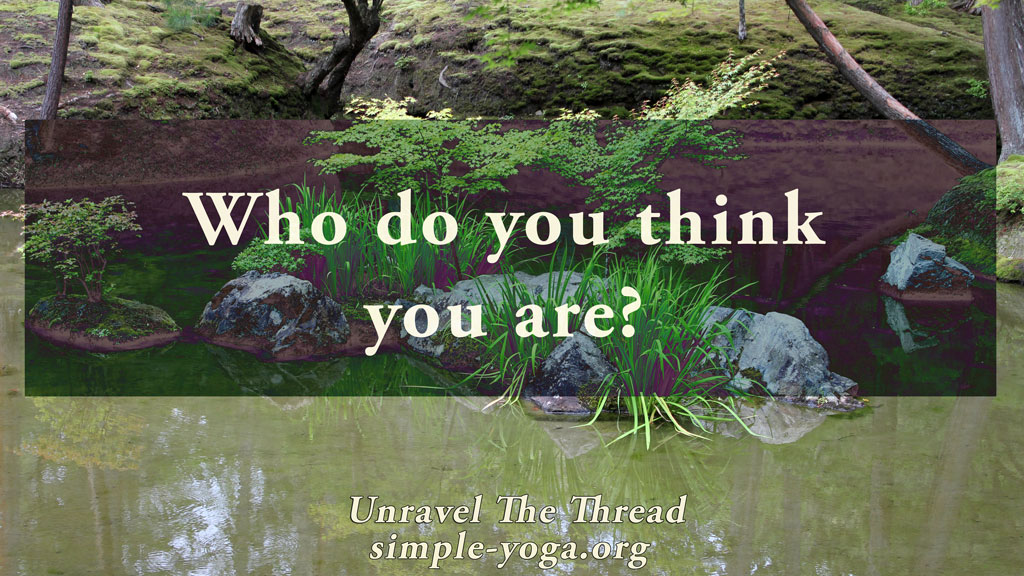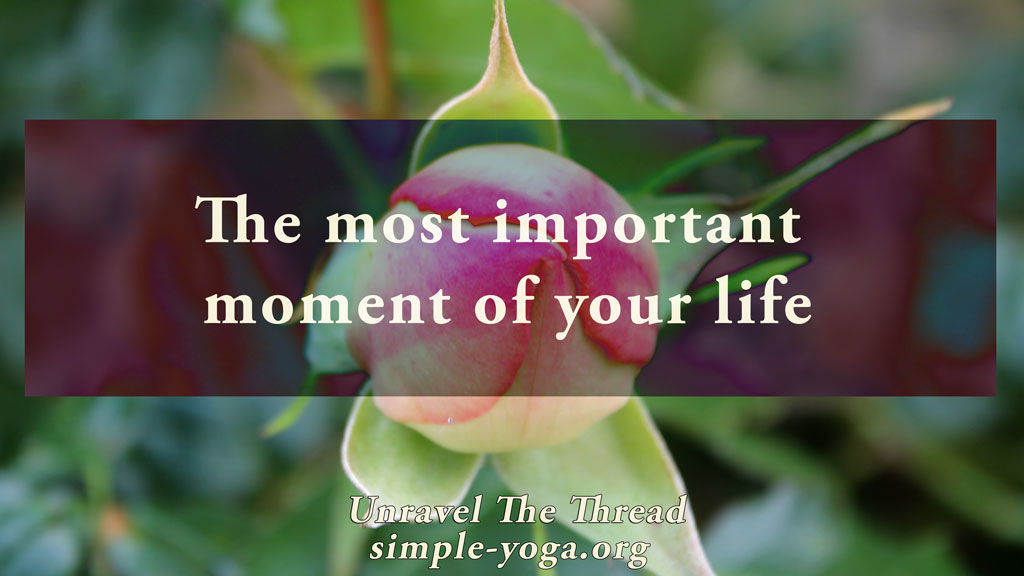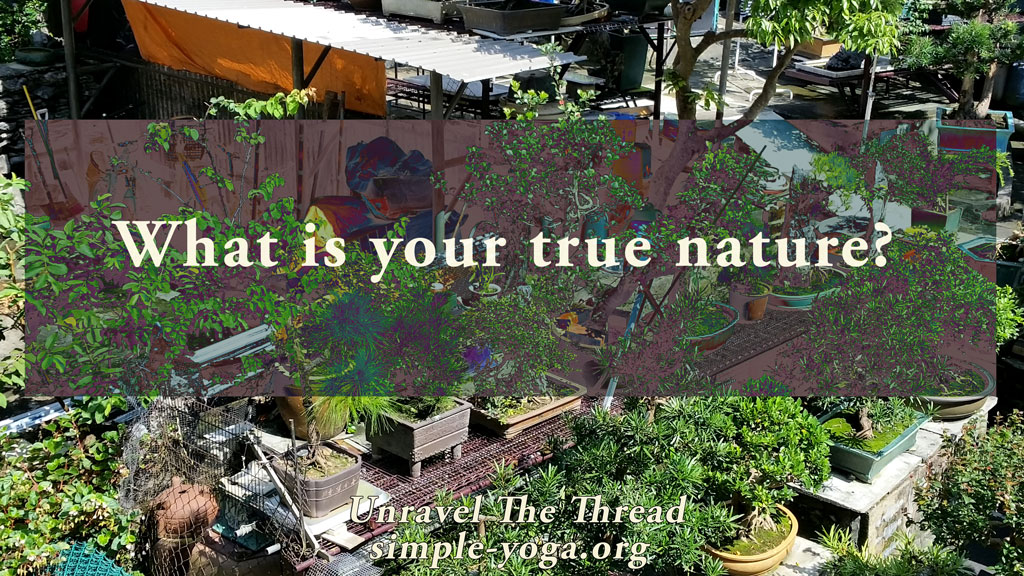
Who do you think you are?
February 20, 2023
What is the most important moment of your life?
March 6, 2023
Who do you think you are?
February 20, 2023
What is the most important moment of your life?
March 6, 2023What is my true nature?

What is my true nature?
As we contemplate the questions related to who we think we are, we may start noticing some of the things that we think we are that are temporary and keep changing. Then we may think, clearly those things are not who I really am, because I am still here even when they have changed or disappeared.
Yoga is a practice with a long history, perhaps because in its entirety, yoga relates to one of life’s fundamental questions, a question every human being ponders sooner or later: Who am I? Practicing yoga is an empirical way to explore this essential question, through our ways of moving, breathing, thinking, feeling, and interacting.
So, if I am not who I think I am, what is my true nature? Let’s explore that this week.
Find a quiet space and a very comfortable position. Sit, recline, or lie down. Close your eyes and give yourself permission to disconnect from the world completely by remembering that there is no other place where you can act, and then choosing to be right here. Next, ask yourself, “What is my true nature?” Be curious and calm and listen for an answer. Invite yourself to relax as completely as you can. Notice the sounds and noises coming from outside, away in the distance. After a couple of minutes, notice sounds and noises that are closer to the building you are in. Notice without having to identify or describe, just hear the sound and its own internal structure. Attend to the sounds closer to you, in the room. Don’t describe or narrate, just listen, becoming aware of the multilayered soundscape all around you.
Invite yourself to explore your own internal environment. Start by listening intently to the sounds inside of you. Listen without judgment or narration. Be curious and notice what is happening inside of you without trying to edit or censor what you notice. What internal activities do you notice? These internal activities may be sensations in your body, thoughts, or emotions. If it seems like there are any words in your inner environment, can you choose to let them just flow without trying to control them? Focus your attention on the way your body is breathing, feeling each inhalation and exhalation from the moment you notice air starting to flow into your body, to the transition between your inhalation and your exhalation. Follow the sensations that let you know you are exhaling until you feel the last molecules of air flowing out of your nose. There is no need to control anything. Just stay focused on the natural rhythm of your breath. From time to time, you may find your mind going off on some tangent, into some internal dialogue or description. Perhaps your mind starts planning the rest of your day or week, or maybe it is remembering something that happened recently. Whatever it is, let go of it and choose to attend to your breath with the curiosity of someone who knows that each breath is unique and irreplaceable. Be as relaxed as possible, just as if you were about to fall asleep. If you doze off, or get distracted, gently – without any struggle or strain and without any self-judgment – return to savoring this moment, when there is nothing else to do and no other place to be. Once you feel ready to finish, gradually stretch, breathe more deeply, and open your eyes.
Even when you try to be very relaxed and make time to do nothing but relax, you’ll notice how your ways of being, like your tendency to complain, plan, comment or narrate, will pull you out of just being with what is, and into the complex ideology you have been constructing in your head throughout your whole life. Most people teeter between being and doing. In doing mode, the mind gets busy by trying to make sense of whatever it is noticing. However, in being mode, the mind settles and observes without reactivity. The internal activities you noticed in the previous exercise, your ways of being, keep changing, coming and going throughout the day. In order to go to sleep, you release all those ways of being. But very soon after you wake up in the morning, they seem to start on their own again. In fact, quite often, it seems that those ways of being are in charge of running your life. You can further your inquiry by asking yourself:
- If there are ways of being that can be turned on and off, are they essential?
- Are these ways of being fundamental to being who I am?
- Since some of these ways of being have not always been part of my internal environment, does that mean that they are not necessary?
- What is left when those ways of being are turned off? Does that even happen, ever?
- Where are all those ways of being manifesting?
As with other exercises on this journey, the only way to find out if this line of inquiry is useful for you is to explore it.
At the end of the day, when you are ready to fall asleep, you may find some lingering thoughts, perhaps some plans about what you are going to do tomorrow, or maybe some thoughts related to how the day went, or maybe some regrets about the things that could have been done differently. Eventually, all of us, in order to go to sleep, have to let go of all of those internal activities. When that finally happens, body, mind, and emotions surrender and relax fully. That is the moment when we fall asleep. Sleeping soundly enables your body to shift its focus from the world outside to the internal experience. This enables you to invest resources in healing, restoring, and replenishing. The converse process happens every morning when, right before opening your eyes, you realize, “I’m not asleep anymore.” Soon your internal space is filled with a rush of ideas, tasks, thoughts, plans, and things to do, and the daily race begins anew. I suggest that all those internal activities that occupy your inner space are temporary and not essential to your being. If they were essential, it would not be possible to let go of them.
This week, I invite you to pay attention to your true nature. What is underneath all the activities that you engage in, both internally and externally?
Where are all those activities taking place? Instead of trying to capture a single specific answer in words, notice if the simple experience of being may offer you a connection to what your true nature is. In other words, what aspect of you remains even when body, mind, emotions, and activities change? What remains when all activities seem to stop?
Embrace these questions without rushing to find answers and notice if living with these questions may influence the quality of your experiences and the quality of your participation in your life.
If you prefer, you may listen to the podcast:
This is an excerpt from the book Unravel the thread: Applying the ancient wisdom of yoga to live a happy life
If you find Simple-Yoga.org and Unravel the thread useful, consider supporting my labor with a donation, you may also donate using PayPal or Venmo. Thank you!
